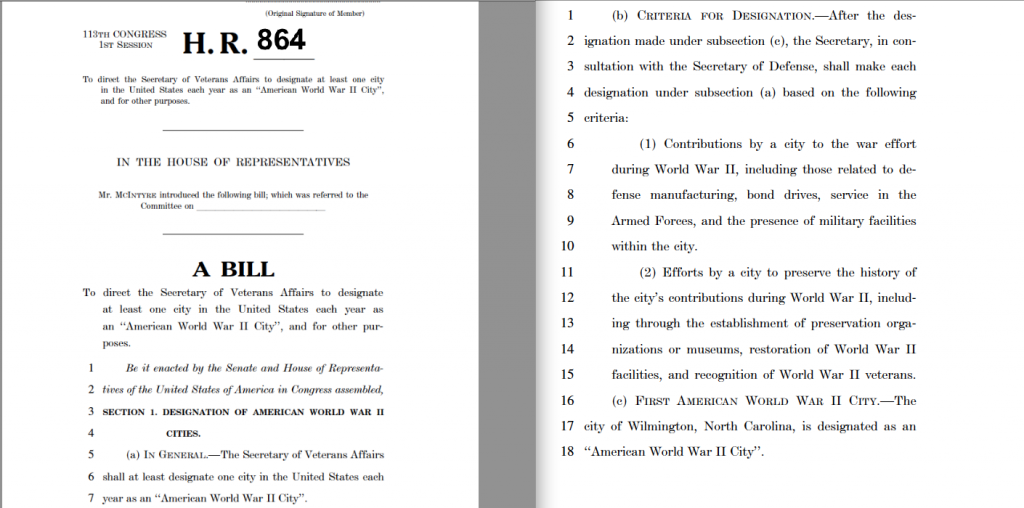Wilmington First “American World War II City” Designee
February 27, 2013
 Washington, D.C. – U.S. Congressman Mike McIntyre has again introduced legislation in the U.S. House to designate at least one city in the United States each year as an “American World War II Cityâ€, with the first being Wilmington because of the city’s remarkable contributions to the U.S. war efforts during World War II.
Washington, D.C. – U.S. Congressman Mike McIntyre has again introduced legislation in the U.S. House to designate at least one city in the United States each year as an “American World War II Cityâ€, with the first being Wilmington because of the city’s remarkable contributions to the U.S. war efforts during World War II.
McIntyre has been working with the World War II Wilmington Home Front Heritage Coalition for the last couple of years to bring this national recognition to Wilmington.
Congressman McIntyre stated, “Wilmington’s long and distinguished contributions to the World War II effort should be honored and celebrated. This bill will ensure that and will also set in place a procedure for other cities to receive this rightful designation. As a nation, we should never forget the tireless efforts of those who supported our brave men and women in uniform, and Wilmington stands at the top in support of community contributions and effort. I look forward to doing all I can to ensure passage of this important measure.â€
Under the legislation, the Secretary of Veterans Affairs would designate at least one city in the United States each year as an “American World War II City†based on a set of criteria that includes: contributions to the war effort, efforts to preserve the history of the city’s contributions, and the presence of military facilities within the city.
Among the City of Wilmington’s contributions include:
- During World War II, Wilmington was the country’s unique wartime boomtown, aptly and officially named “The Defense Capital of the State.â€
- Wilmington based and trained all five military services—the Air Force at the Wilmington Airport, the Army at Camp Davis and Fort Fisher, the Navy at Fort Caswell, the Coast Guard at Wrightsville Beach, and the Marine Corps at Camp Lejeune.
- The North Carolina Shipbuilding Company of Wilmington, the state’s largest employer at that time, constructed 243 cargo vessels with which to provide goods and equipment to our soldiers.
- Wilmington provided the Atlantic Coast Line Railroad headquarters, three housing camps for German prisoners of war, a major training base for P-47 fighters, defense industries producing goods and equipment, a British patrol base, and a shipping point for Lend Lease supplies to the Allies.
- Wilmington’s dispatched thousands of its sons and daughters to fight the enemy on land, sea, and air as Navy frogmen, P-51 fighter aces, Tuskegee Airmen, submarine skippers, bomber pilots, Marine riflemen, Army artillerymen, physicians and nurses, and volunteers of all sorts.
- Wilmington tragically lost 248 men as a result of their courageous efforts to defend America and two New Hanover High School graduates received the Congressional Medal of Honor and numerous others received high decorations for valor, including Navy Crosses, Distinguished Service Crosses, and Distinguished Flying Crosses.
- Wilmington’s strategic position made it vulnerable to enemy attack by German U-boats, which marauded shipping off our beaches. In July 1943 a U-boat fired at the Ethel-Dow chemical plant in Wilmington, perhaps the only German attack on America. Wilmington endured this attack, as well as constant civilian defense restrictions and air raid drills, including black-outs and dim-outs. The city’s population more than doubled with the influx of military personnel, forcing locals to cope with strain on housing and schools, transportation, medical and social services, law enforcement, and food supply.


